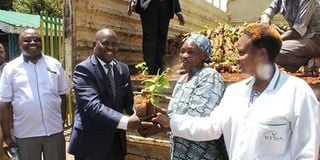Breaking News: CDF Francis Ogolla involved in KDF chopper crash
Nyeri tea farmers to benefit from Sh1m seedlings project

Nyeri Governor Mutahi Kahiga (2nd left) launching the distribution of seedlings of a new tea clone at Iriani Tea Factory in Othaya on April 3, 2019. The new tea variety is said to be resistant to drought and diseases and has high yields. PHOTO | IRENE MUGO | NATION MEDIA GROUP
What you need to know:
- Governor Mutahi Kahiga flagged off 50,000 tea clones to be distributed to farmers in all the five KTDA factories.
- Each factory will receive 10,000 seedlings.
- Tea production has increased by 8.6 percent in the past eight months countrywide.
More than 35,000 small scale tea farmers in Nyeri will benefit from a Sh1 million project by the county government meant to spur tea production.
On Wednesday, Governor Mutahi Kahiga launched the distribution of 50,000 tea clones to be given to farmers in all the five factories affiliated to the Kenya Tea Development Agency (KTDA).
Each factory will receive 10,000 seedlings.
The clone, TRFK 300, sourced from Kuresoi, is said to be tolerant to drought and pests and has higher yields compared to the conventional clones that farmers are currently relying on.
INCREASED PRODUCTION
“The seedling we are distributing now will ensure farmers have increased their production by at least one kilo which is above the old clone from which they could not get a kilo-and-a-half from a bush,” Governor Kahiga said.
The cloned variety is expected to give farmers three kilos per bush and they are expected to start benefitting from it in the next three years.
According to the acting Region Two manager Anthony Muriithi, of the 56 million tea bushes in the county, there is a 1.4 million gap for farmers whose plantations have dried due to climatic conditions and diseases.
“Farmers are losing a lot and not managing to generate a good income for themselves with the old clones hence the need to replace them," he said.
Tea production has increased by 8.6 percent in the past eight months from 744 million kilos to 808 million kilos countrywide.
In Region Two, which covers factories in Nyeri and Murang’a north, production has increased by 15 percent from 91 million kilos to 105 million kilos in the last eight months.




